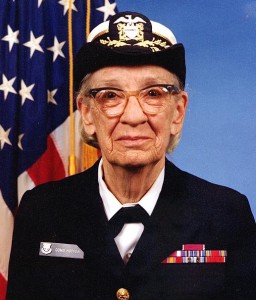
Hailed as the world’s largest annual gathering of women in computing, the Grace Hopper Celebration of Women in Computing Conference was held in Houston, Texas from Sept. 26–28.
Named after the 20th century computing expert US Navy Rear Admiral Grace Hopper and produced by AnitaB.org and the Association for the Computing Machinery, the Grace Hopper Celebration (GHC) aims to raise representation in the CS industry. According to their website, the GHC is a celebration for women technologists, by women technologists.
The Computer Science (CS) industry is overwhelmingly male-dominated and incredibly white. According to StackOverflow, a popular online forum for programming, 93.1 percent of professional developers identify as men and 74.3 percent identify as white.
Last year, the GHC reported over 18,000 attendees from over 81 countries, and more than 30 percent of speakers were women-identified people of color. People from all different points in their career attended, from students to Executives. Over 1,300 organizations attended—corporate, academic, nonprofit, national lab and government organizations were all represented in varying degrees.
Mills computer science Professor Susan Wang recommended her CS students attend the GHC.
“To see, meet, hear from and connect with women from all walks of computing is an amazing and inspiring experience,” Susan Wang said. “It is hard to quantify the impact, both socially and in numbers, that the Grace Hopper conferences have had on the participants but I think the word ‘tremendous’ describes it well.”
Several students from Mills College made the trip. Some students paid out of pocket while others applied for and received scholarships to attend. One of those students was Regina Wang.
“It’s a good opportunity to hear from so many women, not only from the keynote speakers, but also when you’re waiting in a line for something,” Regina Wang said. “Some of the best conversations I had were while I was waiting in line for a bagel.”
Ying Parks, a master’s student in interdisciplinary computer science (ICS), echoed that sentiment of direct access.
“You’re waiting in line for the bathroom just making conversation and you’re talking to the senior vice president of a tech company,” Parks said.
Susan Wang noted that the conference “provides mentoring and opportunities to connect” as well as a massive career fair.
Student Tania Ortiz-Rosales attended the conference for the first time this year.
“All you could see was a huge area with rows and rows of closed-off work spaces and tons of whiteboards. I even walked through the area later on and could see live interviews all happening back to back,” Ortiz-Rosales said. “The positivity of the entire environment really pushes everyone there to pave the way for yourself and other women in tech, too.”
Experiences like that can be overwhelming at first, expressed Ortiz-Rosales, but rubbing shoulders with women who are well-established in their careers can be a source of inspiration.
“It kind of gives a glimpse of the future,” Ortiz-Rosales said. “If they could do it, any one of us can, too.”
Parks, a first-time attendee, commented that it was an emotional experience at times.
“I was crying when I attended a few speakers’ talks…[they were] hugely inspiring,” said Parks.
However, when she wasn’t attending talks, she was able to get onsite interviews on the spot, just by showing up at the career fair.
“If you are looking for a job, there are hundreds of companies with lots of openings,” Parks said.
Among those hundreds of jobs, Regina Wang felt that most were “genuinely trying to increase diversity and build a better culture,” an important point given the staggering under-representation of women and people of color in a field that few today realize was pioneered by women like Grace Hopper or NASA mathematician Katherine Johnson (featured in 2016’s “Hidden Figures”).
Regina Wang, who transferred to Mills from art school after studying fashion, realized she was more interested in the technical aspects of the discipline and took to making her own websites until she decided to enroll in the Introduction to Computer Science course at Mills.
“I recommend just trying it out. A lot of people in the [computer science] department didn’t come in with a CS background. Their first CS course here was their first time getting exposed to programming,” Regina Wang said. “I recommend everyone try it out.”
Ortiz-Rosales also had some recommendations.
“Be determined! Just because it may get difficult and you may not fit the status-quo of the technology field doesn’t mean that you aren’t worthy of being a part of the tech scene,” Ortiz-Rosales said. “Impostor syndrome is real, especially for any minority.”
